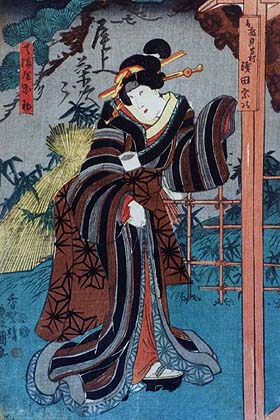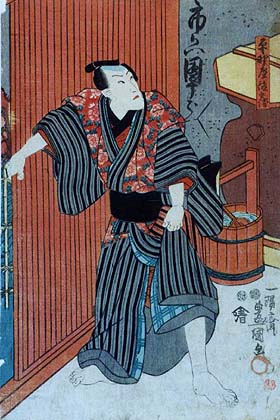| SONEZAKI SHINJÛ |
| Play title | Sonezaki Shinjû |
||||||||
| Author | Chikamatsu Monzaemon | ||||||||
| History |
The play "Sonezaki Shinjû" was originally written for the puppet theater (Bunraku) and staged for the first time in Ôsaka at the Takemotoza in the 5th lunar month of 1703. It was based on a real event that happened in Ôsaka in the 4th lunar month of 1703. "Sonezaki Shinjû" was adapted for Kabuki a few years later and staged for the first time in the 4th lunar month of 1719 at the Nakamuraza in Edo. The roles of Hiranoya Tokubę and Tenmaya Ohatsu were played by Ichikawa Danjûrô II and Sanogawa Mangiku. It was regularly performed up to the thirties in the twentieth century. "Sonezaki Shinjû" was revived in August 1953 at the Shinbashi Enbujô, starring Nakamura Ganjirô II and his son Nakamura Senjaku II in the roles of Hiranoya Tokubę and Tenmaya Ohatsu. They achieved such a great success that the play became one of the most popular ones in the Kabuki repertoire. Nakamura Ganjirô II and his son Nakamura Senjaku II performed it together 645 times, either in the main theaters or on tour all over Japan. In December 1980, at the Minamiza (Kyôto), Nakamura Tomotarô had to replace definitively his grandfather Nakamura Ganjirô II, who fell sick, in the role of Tokubę. The new duet was as successful as the first duet and the 16th of january 1995 Nakamura Ganjirô III celebrated on the stage of the Nakaza in Ôsaka his 1000th performance in the role of Ohatsu. |
||||||||
| Structure |
The current structure is one act and three scenes:
|
||||||||
| Key words |
Gidayû Kyôgen Ikutama Ikutama Jinja Sewamono Shinjû Shinjûmono |
||||||||
| Summary |
In the precincts of the Ikutama Shrine a rich country man named Gihei and his flatterers are chatting about the best way is to enjoy the evening. They decide to buy the famous courtesan Ohatsu of the Tenmanya teahouse and take her out to a party. Ohatsu, however, pleads that she has been made to drink too much and now has a bitter headache. Under the circumstances, Gihei and his friends are forced to abandon their plans. Ohatsu is, in fact, in love with a clerk at Hiranoya soy shop named Tokubę. She is in bad shape because her lover has not been to see her for a long time. Then the maids of the teahouse cheer her up with a message from Tokubę, saying that he is coming to see her this very day. Soon Tokubę appears. Ohatsu complains of his long absence and cannot understand why he is so quiet and aloof. Finally he tells her all about his troubles. His uncle and boss, Kyûemon, is so pleased with his industrious attitude at work that he arranged for Tokubę to marry his wife's niece, an heiress. When Tokubę refused the offer, he discovered that his stepmother had already accepted the dowry in advance from the niece's parents. The money had to be returned to the parents, so Tokubę went back to his hometown, where his greedy stepmother lives. He managed to get the money back from her. Then on his way home with the money, he encountered an old friend named Aburaya Kuheiji, who was in need of money. Kuheiji persuaded Tokubę to lend him the money saying it would be just for three days. Lacking the courage to refuse his old friend's request, Tokubę agreed to the loan on condition that Kuheiji repay it in three days without fail. He later realized that this had been a grave mistake. Consequently Kyûemon was forced to pay the dowry back to the girl's parents on Tokubę's behalf. Since Tokubę refused to marry his aunt's niece, his uncle insists that he should settle his debts with him and then leave town forever. Tokubę explains to Ohatsu that this is why he has not been to see her for so long. Ohatsu is overjoyed to find out that he still loves her and seeks to comfort him. At this time Kuheiji enters, accompanied by a party of his friends, and all are apparently the worse for drink. Tokubę goes to him and presses him to repay the loan, but Kuheiji denies all knowledge of it. When Tokubę produces a promissory note, Kuheiji declares it to be a forgery. A crowd gathers. Tokubę, in despair and frustration, attacks Kuheiji, causing a fight to break out. Gihei happens to come upon the scene, catches hold of Ohatsu, and forces her to leave in a palanquin with him. After returning Ohatsu weeps as her fellow courtesans whisper unkind things about her lover. Kyûemon comes to the door and asks for her. When she goes out to talk with him, he pleads with her to give up Tokubę, saying she is spoiling the advantageous match arranged for him and driving him to squander money which is not his to spend. Ohatsu denies these charges, swears that her love for Tokubę is true, and denies any knowledge of his whereabouts. Then Kyûemon goes into the Tenmanya to talk with the proprietor, leaving Ohatsu to worry about her lover. But, to her great joy, she Tokubę comes to Tenmanya to see her secretly. Ohatsu and Tokubę embrace tenderly, and she tells him of his uncle's visit. They are interrupted by the arrival of Kuheiji and his friends who fortunately are too pleased to notice Tokubę in the dark shadows. Ohatsu is forced to go back into the house, as they have come especially on her account. In order to hide Tokubę, she leads him under the verandah and then sits on the step. Kuheiji has come with the intention of ransoming Ohatsu with the money which was taken from Tokubę. He lays the money out on the mat and asks for her redemption. Ohatsu can see no way out of this desperate situation. She makes it clear during the ensuing conversation, in which her answers are really intended for Tokubę, that she is ready to join her lover in putting an end to their unhappiness. In her anxiety to make sure that Tokubę understands, she taps her clog on the stone step to give emphasis to her words and stretches out her naked foot in Tokubę's direction. He caresses her foot to show that he understands her intention and draws her instep across his throat as if it were a sword to show that he also is ready to die. Kuheiji thinks that she must be drunk to talk in this extraordinary way, professing her willingness to die. Brandishing his money under her nose, he goes off to conclude the bargain. Ohatsu is forced to go to her room without speaking directly to Tokubę. After a while a bell tolls. Ohatsu creeps out of her room, dressed in white, clutching a rosary and a razor. She attracts Tokubę's attention, puts out the lamp, and in the dark the two grope towards each other. When they stumble, the master of Tenmanya awakens, but the couple manage to get safely away before a maid relights the lamp. No sooner have they gone out of the room, than one of Kuheiji's servants comes to the door calling for his master. Their conversation reveals Kuheiji's dirty plot to defame Tokubę. Because Kuheiji has foolishly neglected to give his men a share of the stolen money he has swindled, they now desert him. Kyûemon, who has overheard their talk, bursts into a rage, breaks into Kuheiji's room, and beats him mercilessly. A servant is sent to fetch Ohatsu to see if she knows where Tokubę is hiding, but returns instead with Ohatsu's final letter. Kyûemon, deeply affected, immediately organizes a search party for the couple. Mournful reverberations from a temple bell are heard. The two lovers, unaware of the change in their fortunes, are on their last journey into the forest of Sonezaki. They walk the road to death quietly. Seven strokes of the temple bell mark the dawn; six have sounded. The remaining one will be the last echo for these two. This summary has been written by Watanabe Hisao and edited by Jeff Blair [website] |
||||||||
| Comments |
"What makes "Sonezaki Shinjû" so novel is that it is the first Japanese play to take as its hero and heroine not an aristocrat, warrior or some historical personage nor a legendary hero already known to everyone, but obscure townspeople. Then, too, though its form was that of dramatic poetry meant to be delivered by a reciter rather than spoken by actors, the play is a realistic dramatization of a true incident, depicted almost exactly as it actually happened" (Kawatake Toshio in "Kabuki: Baroque Fusion of the Arts") |
 |
 |
| The actors Onoe Kikujirô II and Ichikawa Danjûrô VIII playing the roles of Tenmaya Ohatsu and Hiranoya Tokubę in the drama "Shimo no Tsurugi Sonezaki Shinjû", which was staged in the 11th lunar month of 1849 at the Kawarasakiza (print made by Utagawa Toyokuni III) | |
|
|
| Contact | Main | Top | Updates | Actors | Plays | Playwrights | Programs | Links | FAQ | Glossary | Chronology | Illustrations | Prints | Characters | Derivatives | Theaters | Coming soon | News |